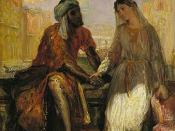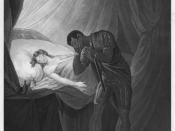"Most potent, grave and reverend signiorsâ¦..He wrought upon her."This quote form Othello is a speech given to the senators in the court room. Othello begins by addressing them as "Most potent, grave and reverend signiors." This is a sign of respect and he wishes to explain the situation clearly. Othello admits openly that he has married Desdemona. "That I have ta'en away this old man's daughter." Instead of trying to deny or hide it, Othello says "true I have married her." By beginning his speech in this manner, he attracts everyone's attention. Brabantio would have thought Othello would put up a fight or at least protest. Othello continues with "Rude am I in my speech." He admits that his language isn't as good as the Venetians and that he doesn't have excellent vocabulary. This makes his speech different from the other characters.
Othello talks about his military background and says "more than pertains to feats of broil and battle."
He continues to grab the senator's attention by telling "a round unvarnished tale deliver." Othello will explain plainly and straight forward his story. "unvarnished" means that there will not be alterations or lies. He suggests that he will deliver a honest, truthful story which has "of my whole course of love." The words "drugs", "charms", and "mighty magic" in Othello's days related to witches and wizardry. These types of people were treated as outsiders and rejected by society. When Othello uses these words he is trying to say that there is no trickery involved, just plain love. His last words In his speech "I won his daughter" gives a suggestion that Desdemona is somewhat like a trophy wife. The word "won" is usually used to describe objects, not people. The word "won" could also be seen that Othello has proven...
![From the Library of Congress: TITLE: Thos. W. Keene. Othello CALL NUMBER: POS - TH - 1884 .O7, no. 1 (C size) [P&P] REPRODUCTION NUMBER: LC-USZC6-58 (color film copy transparency) RIGHTS INFORMATION: No known restrictions on publication. MEDIUM: 1 print (](https://s.writework.com/uploads/9/94760/library-congress-title-thos-w-keene-othello-call-number-pos-thumb.jpg)

